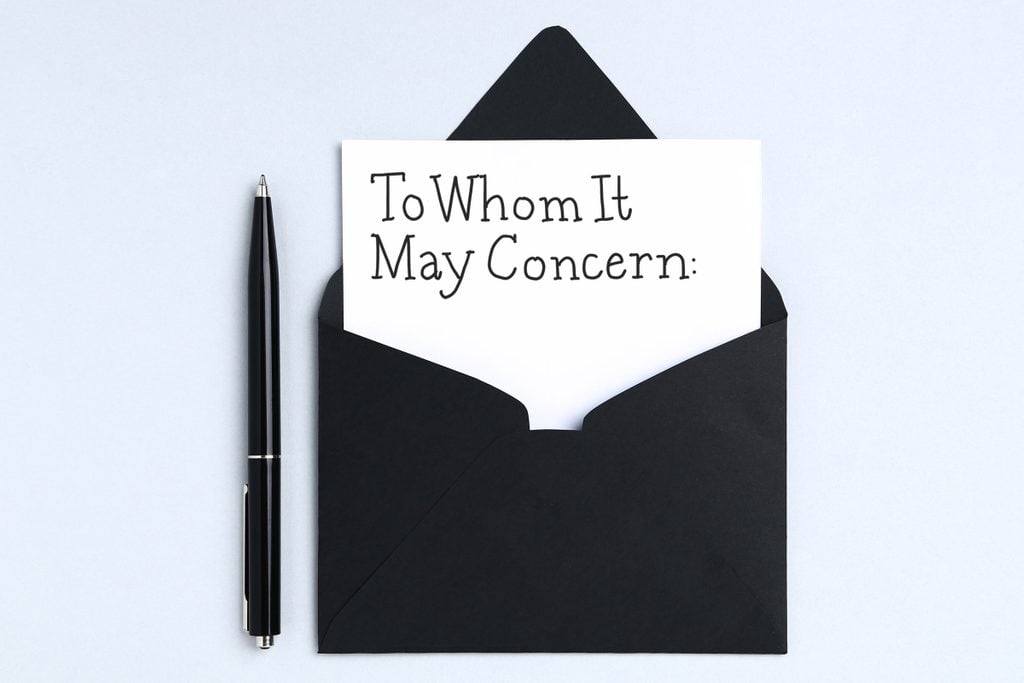To Whom It May Concern: What It Means and How to Use It
Updated: Nov. 25, 2022

There are times when we need to write important letters to people who we don't know, and who may be in positions of authority (for example, HR managers and future bosses). Here's how to begin letters and emails with this formal salutation—and when you shouldn't.
What does “To Whom It May Concern” mean?
You’ve probably heard or come across this greeting, likely in your professional life. “To Whom It May Concern” is a greeting that you can use to start a correspondence, like a letter or email. It basically means: “to whoever is the most appropriate recipient of this correspondence.” The “it” in “To Whom It May Concern” refers to the contents of the correspondence or letter, be they a complaint, job application, or testimonial. You’re basically indicating that your correspondence should reach the most relevant person. Here are 70 more words and phrases you might be using wrong.
The potential issue with “To Whom It May Concern”
Chances are you’ve heard that this greeting is outdated, or stuffy, or non-personable. In particular, career experts are increasingly trying to discourage people from using it in job applications or cover letters. The reason for that? Using “To Whom It May Concern” indicates to the person reading your letter that you did not do the research necessary to find the correct person that your letter should go to. It’s also just very impersonal, which employers might not appreciate. Find out more resume mistakes that could cost you the job.
When to use “To Whom It May Concern”
The real benefit of using “To Whom It May Concern” is that it gives you an applicable greeting to use when you have no idea exactly who the recipient of your letter is. If you’re writing to a faceless customer service representative, for instance, “To Whom It May Concern” can be appropriate. If it’s a person you hope to have any future relationship with, though, you should make more of an effort to find out exactly who they are.
If you do know who your letter is going to by name, use their name! Even if you have an idea who it’s going to, use that. For instance, if you just aren’t able to find the name of the person in the position that you’re sending your job application to, put the title of the position. Most job recruiters will find “Dear Executive Editor” preferable to “To Whom It May Concern.” Learn 49 secrets your boss won’t tell you, but you need to know.
Do you really need to capitalize every letter?
The words “to whom it may concern” are not proper nouns or names. So why is this greeting formatted with them all capitalized? Well, they don’t necessarily HAVE to be, but that’s usually how people prefer to format it. It just looks better that way as a greeting. “Think about this phrase as a replacement for someone’s name,” Indeed.com explains. “You would capitalize each first letter in a person’s name…and it is polite and professional to use capitalization when addressing someone.” Check out 10 types of words you never knew had to be capitalized.
Why not “who”?
The difference between “who” and “whom” is a common grammar conundrum, but the basic rule is that “who” refers to the subject of a sentence or clause, while “whom” refers to the object. In this specific instance, “it” is already the subject, and “whom” is the object of the verb phrase “may concern.” So “whom” is the correct choice. For more on “who” vs. “whom” and more, brush up on the 20 most confusing rules in the grammar world.
Colon, not comma?
When you start writing a letter, you usually follow the greeting with a comma (for example, “Dear Mom, …). Should “To Whom It May Concern” be followed by a comma too?
Again, this is not set in stone, but the colon is generally considered more formal here. If you’re writing a business letter or job application, formal is the way to go. Commas work better for personal correspondence. Find out more about the only times you should use a colon.
Here’s an example:
Formal:
To Whom It May Concern:
or
Dear Professor Rodriguez:
Casual:
Dear Mom,
or
Hi, Rachel,*
*Note: See that extra comma in between the “Hi” and the “Rachel”? An English teacher will give you bonus points for knowing that this comma should be there. But if you’re scratching your head, that makes sense: Hardly anyone uses the extra comma. In fact, it’s one of the grammar rules you’re probably safe ignoring.
The bottom line
If you’re writing a formal letter to a company (say, lodging a formal complaint); writing a letter of recommendation; or writing a letter of introduction/interest, it’s perfectly fine to say “To Whom It May Concern.” Consider this, though: Whenever you can find the name of a real human being, that’s always going to be a better bet. Your concern will be more likely to end up in the right hands. In the era of the Internet, it’s not usually that hard to find the correct spellings, job titles, and email addresses of specific individuals. You’ll want to avoid these cover letter mistakes that could cost you an interview.
Source:


